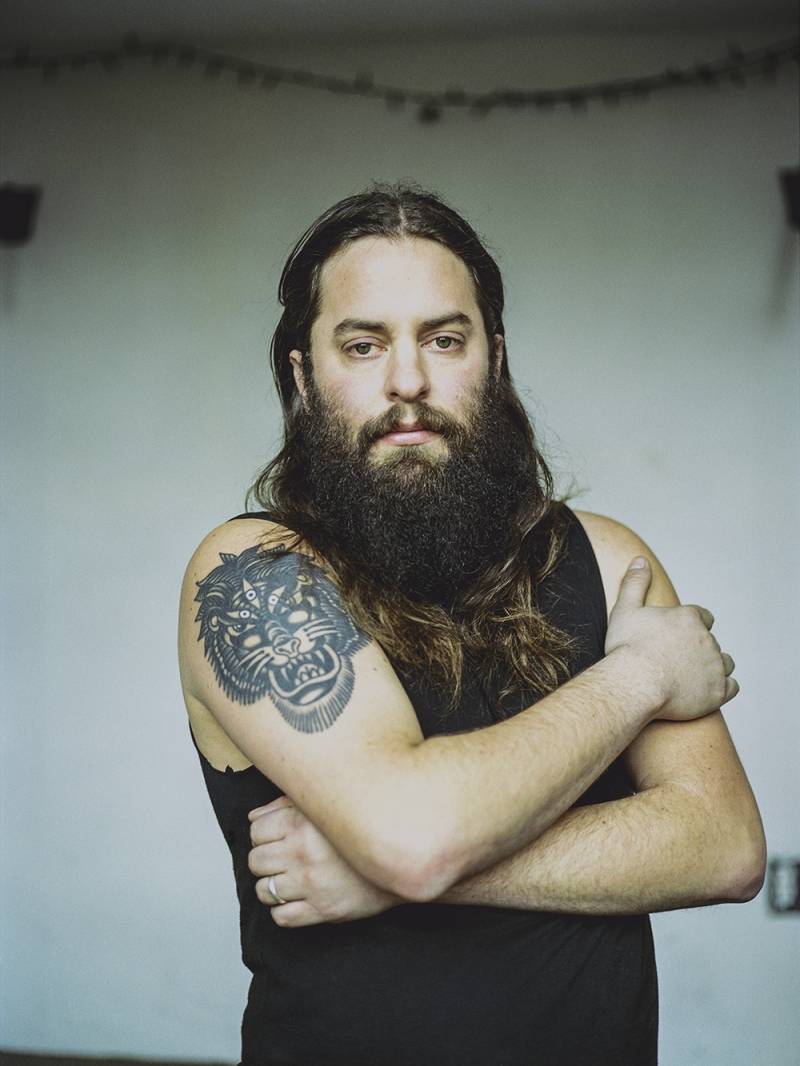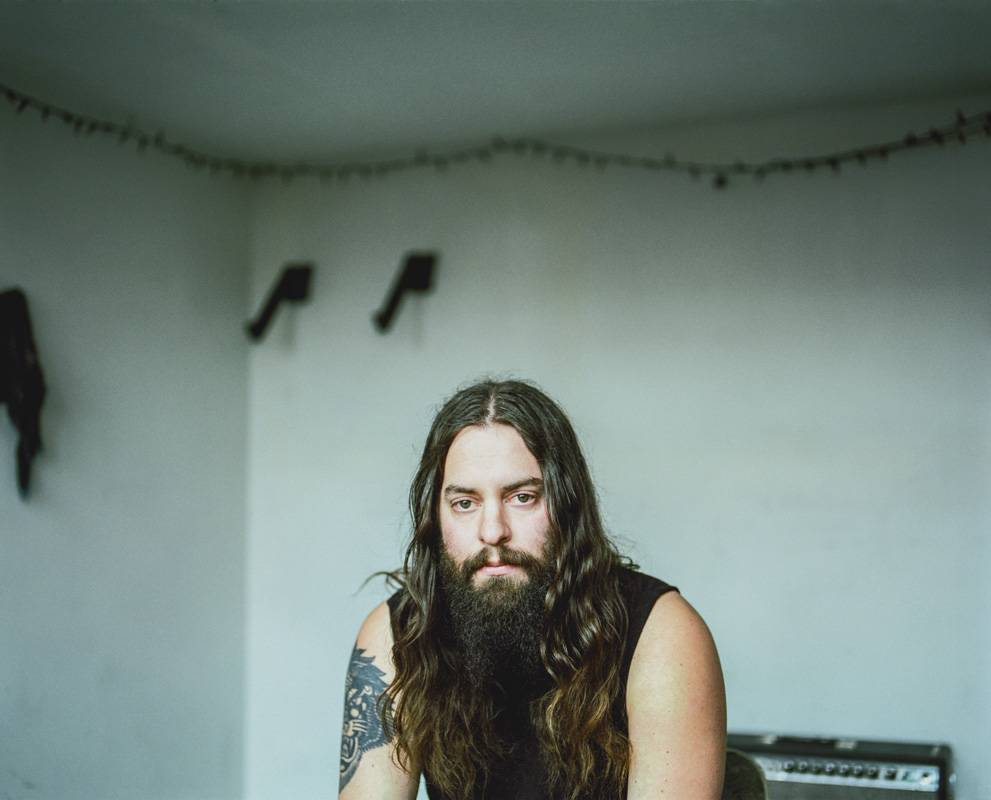“Third time’s the charm” may be the saying, but Strand of Oaks isn’t playing by the rules anymore. With his fourth album HEAL, frontman Tim Showalter’s project takes a huge leap forward, hitting a closer note to his original vision. If the past three albums exuded a predominantly Americana sound replete with woven guitar and harmonies, HEAL breaks free of any and all expectation. From the hard-edged tempo and frenetic guitar wails of the album’s first song “Goshen ‘97” to its often darker but no less energetic (and emotional) songs, it’s clear this is a new, exciting step for Strand of Oaks. For Showalter, the album became a catharsis both personally and musically. Not only did the act of writing, recording and playing live shows allow him to work through his past, but he also used all that time to push himself into new musical territory. The result has audiences reeling. Strand of Oaks plays The Highdive on Tuesday and, in the midst of his current tour, Showalter spoke with me about the healing process of HEAL.
Smile Politely: The best music builds toward a release that satisfies the audience. What is the release you get with HEAL?
Tim Showalter: It’s the entire manifesto of the album. You know, I made it to save money from going to therapy. It’s a pretty quiet place when you make a record. What I was most nervous about was playing these songs live, because I thought, “I’m going to have to drudge up my dark subconscious every night and I hope I don’t lose my mind.” Then I instantly discovered from the first two shows that this was the best thing I could’ve done. I’m feeding off what the audience is feeding off of, and what that turns into is “We’re all connected.” They want to experience something and I want to experience something, too, and it turns out to be this extremely powerful, cathartic experience. It’s not heavy-handed either. You don’t have to, like, cry in a corner, you can drink beers and pump your fist. I probably fluctuate between Elliot Smith and Andrew W.K. onstage and I think it’s… that’s truly the release there. You know there’s something about playing guitar loud and playing with a band.
SP: How is the audience’s responding? Are you getting people crying in the corner?
Showalter: I think people are losing their shit in the best possible way. At the beginning I assumed people thought the same thing as me, “Oh man, this is going to be a bummer of a show, should I even go?” But we’ve turned it into this environment, where — I’m not bashful to say — I look up to people like U2 and Springsteen, and I appreciate people spending money to see me. That’s their night out. Things are cheaper at home, there are things like Netflix, but if you choose to come out, I’m going to lose my voice and get really sweaty and probably get bruises. It means everything to me that people are attending, because I existed for a long time where people didn’t come to my shows.
I was just listening to Henry Rollins talk about his approach to the stage and it’s always a point of inspiration. The second you think you are too good for four people at a show, you should quit and go work in an office. There are still people at the concert and they spent money on this ticket, so give them your best, and if you give them your best it’s gonna be 50 people next time, maybe. That’s how it grows. I want to see guys or girls who work for this. Maybe it’s a little blue collar, but you know.
SP: What a response if HEAL is this album where you’re working through stuff towards a release, and the audience is so accepting of that work.
Showalter: Yeah, I think it’s amazing. It’s the way I want to interact with people. Maybe that’s why I like playing concerts and meeting people the way I do, because there’s no bullshit. If I talk to somebody before a show or after a show, we don’t have a long time to talk and I may have never met them, so we talk about real stuff instantly. And sometimes people tell me some real personal stuff, and I then tell them personal stuff, because I think it’s about sharing and connecting, and not looking at the fucking computer screen for a few minutes.
SP: In today’s world? What is that? What does that even look like?
Showalter: Exactly. You know, it’s funny, I’m not the best with computers or communication when I’m on the road or at home, and I’ve had fans come up to me and say “Well, I tried to email you,” and I was like “Well, you’re talking to me right now. Don’t get mad about that, let’s just talk right now.” And that interaction’s the fuel. If you start gathering that, that gives you more inspiration to write better songs.

SP: Would you say Illinois or the Midwest has influenced your sound?
Showalter: I didn’t get to grow up in a place like Champaign, you know a college town with record stores and a scene. I grew up in a town an hour and a half away from Champaign, where I gotta drive two hours to take a girl on a date to a movie theater, or something like that. You have to create your own world. I think I would’ve been worse off as an artist if I’d been surrounded by cool culture. Because I didn’t have that I was forced to, well, I like heavy metal and electronic music and I like folk music and rockabilly, and there were no rules. When it came time to make records, especially HEAL, I just did all of it. Everything I like I’m going to throw on the record.
SP: That’s so great you’ve been able to push yourself in that way, instead of doing something easier.
Showalter: I mean I did that for three records. I did what was comfortable and easy, because I can write an apocalyptic love song any day of the week, and I could make thirty more records like that. But I was, like, I don’t want to do that anymore, I want to try something different. I look at HEAL more like my first album — my debut album — because it’s like, yeah, that’s where I want to take it. I’m a different person and I like where my head is going in music and it’s fun and exciting to think about making more records with this attitude.
SP: On the album there are several songs where you fixate on a line and it gets repetitive in this really beautiful way. You don’t build them across a verse or build them into a chorus, they are unapologetically there in this different way. What to you think those repetitions achieve?
Showalter: I feel it’s kind of mantra-like. I think it’s also because I love certain kinds of dance music — repetitive music — that nails something home, and I try to do that with lyrics. If I find something that is powerful for me to say, I just want to say it until it climaxes at a certain point. In the song “Heal” I say, “You’ve gotta heal” because that’s me talking to myself.
SP: It’s almost as though if you say it enough, the words become so powerful they will heal.
Showalter: Yeah. And on that thought, I also think if you say things that you’re afraid of or that hurt you in life, if you say those out loud then they lose power. What am I most afraid of? I’m just going to say it, and it’s done, it’s out there. I say my ex-girlfriend’s name in one song and instead of writing a whole album trying to figure out that whole point in my life, I’m just going to say it and be done. It’s all part of honesty. It was so cool how this year there were so many records where people just decided to do that, like, “I’m going to say what I’m thinking.” I don’t know why, it’s not like we all got together and planned it, but a lot of good records came out because of it.
SP: How has your song-writing process changed or developed since HEAL?
Showalter: I think it’s just that I’m more comfortable with myself. I’ve been writing songs that are even further down the line than HEAL in terms of experimentation, but I don’t care. This feels good to me, and it also provides focus. There’s definitely motivation now. I don’t want to make the same record twice, and I want to make a record that’s better than the last one.
SP: I’ve gotta ask. As a man with a glorious beard, what do you make of this recent term “lumbersexual”?
Showalter: [Laughs] I don’t know. I’m very aware of how I look in a self-deprecating way. I think it’s all about just owning it, especially if it’s how I look. I don’t know why I have a beard or long hair. Ten years ago I just didn’t want to shave anymore. But lumbersexuals? I think it’s just owning who you are, that’s what I think is sexy. As I get older, I don’t care about the superficial shit anymore.
Strand of Oaks plays The Highdive on Tuesday. Tickets are $10 advance, $12 at the door.








